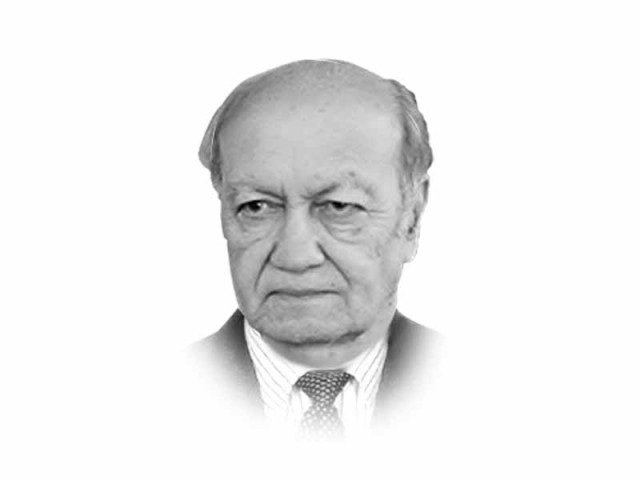Reforming the system
If Khan stands for democracy and a new Pakistan, then he should stand and side with the supremacy of the civilians.

The writer is a retired lieutenant general of the Pakistan Army and served as chairman of the Pakistan Ordnance Factories Board
Khan’s frustration is understandable and the driving force in staging the demonstration. However, it was a smart move on his part not to continue with his protest at least in Islamabad, for that would have been counterproductive and given a wrong message. More importantly, leaders should have a sense of priority and timing. The country cannot afford to be a hostage to political upheaval when it is faced with extremely challenging issues and when the state of our democracy is fragile.
The PPP, the ANP and the MQM, too, had justifiable grievances during elections. They were greatly handicapped as the state failed to provide them with the necessary security and could not campaign on an even playing field and had similar complaints of rigging. It is a different matter that their performance also stood in the way of them not faring well. These contentions aside, it is time that Khan focused on his main responsibility of governing Khyber-Pakhtunkhwa, the province in which he has the mandate.
At a time when the civil-military relations are going through a testing period; the media is locked in fighting for its turf and the terrorists are posing an existential threat; a new leadership may be emerging in India and Afghanistan; it is time for serious business for both the government and the opposition. In this backdrop it is the duty of political leaders to strengthen the democratic system by working within it and not relying on street power to bring about a change. If street power becomes the criterion for influencing events, then we would be regressing back to the politics of the 1990s when parties played musical chairs by using protests and aligned with the establishment to topple governments. The Pakistan Tehreek-e-Insaf should realise that when it comes to arranging huge public gatherings with an attempt to seize power through other means, the PML-N and other parties could well outmatch them. And it is important to be mindful that a protracted tussle on the streets could encourage undemocratic forces to arbitrate and deflect the thrust of the movement, resulting in weakening, instead of strengthening, the system. This would then be similar to what we are witnessing in Thailand right now, or a replay of 1990s when our political parties committed these very errors and invited coups. Of course, the PTI leadership denies this and claims it believes in democracy and that it has no interest in toppling the government, but is only putting pressure to make the system more representative.
An election is only the first step. What is as important is the strengthening of institutions and developing a more tolerant and liberal society. The best way of empowering the people of Pakistan is by reducing the power of the feudal and other elites, making the law-enforcing agencies and the judiciary more efficient and less corrupt, the intelligence agencies being subject to oversight, the bureaucracy working for the people and not lording over them, and parliament legislating for the good of the masses. The government with the cooperation of the opposition should strengthen state institutions, promote education on a priority basis and focus on improving governance. These are the areas for the political parties to work together to change the system and empower the people. The politics of protests, on the other hand, could destabilise an already fragile state.
We need to reflect an image that Pakistan is a resource-rich country, has a well-equipped, professional and modern army, is a responsible nuclear power and has relatively more developed democratic institutions than other Muslim countries. Yet, we falter all the time and fare way behind other developing countries that have less to offer.
Unfortunately, confrontational politics also benefits the TTP and other militant groups, as it is a huge distraction. A united front by political forces would be more effective in dealing with militants. If Imran Khan, in coordination with other political parties, would mobilise a peace rally against the constant harm that the TTP and other militant groups are inflicting on Pakistanis, especially in K-P, that would be a laudable effort. Even on May 11, the TTP made sure that it targets innocent civilians through its barbaric and cowardly blasts.
One of the major reasons for the growing influence of the Taliban and other extremists is poor governance and a state of helplessness on the part of the people. It is sad that there is hardly any interest evinced in the functioning of the various parliamentary committees by Imran Khan or his party. What is the PTI’s position on civil-military relations? Despite some progress, this remains one of the greatest weaknesses of Pakistan today. Lack of cohesion and mutual trust between political parties strengthens the military’s power. Absent a more unified stand, the democratic transition will never be completed. To consolidate democracy, civilian control has to be exercised over areas of foreign and defence policy. But there is hardly any interest shown by political parties, including the PTI. If Khan stands for democracy and a new Pakistan, then he should stand and side with the supremacy of the civilians. As his detractors have rightly pointed out that by aligning himself with Tahirul Qadri, who has nothing good to say about state institutions, the PTI chief undermines the vision of the new Pakistan that he wants to usher in.
Published in The Express Tribune, May 14th, 2014.
Like Opinion & Editorial on Facebook, follow @ETOpEd on Twitter to receive all updates on all our daily pieces.













COMMENTS
Comments are moderated and generally will be posted if they are on-topic and not abusive.
For more information, please see our Comments FAQ